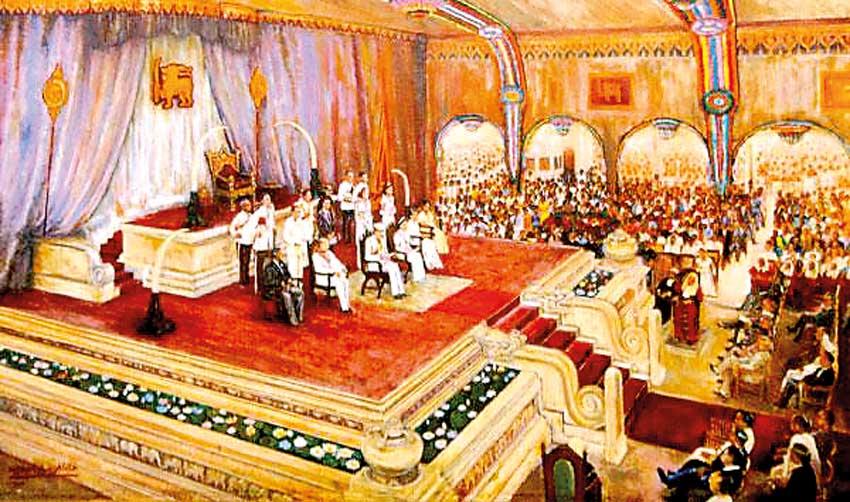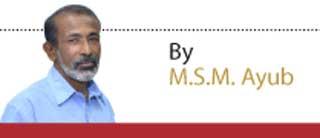04 Feb 2023 - {{hitsCtrl.values.hits}}

An old photograph of the First Independence Day
 The very debate whether Sri Lanka should celebrate its Independence this year amidst an unprecedented economic crisis poses the question of what we, as Sri Lankans gained from the Independence.
The very debate whether Sri Lanka should celebrate its Independence this year amidst an unprecedented economic crisis poses the question of what we, as Sri Lankans gained from the Independence.
It has now been an established and incontrovertible fact that the current economic downturn is the outcome of the failed policies, mismanagement and large-scale corruption of those who ruled this country since Independence, especially by the Gotabaya Rajapaksa administration.
Sri Lanka was not an indebted country when it gained Independence from Britain in 1948. However, the country for the first time defaulted on all its international debt in April last year and still relying on a possible package from the International Monetary Fund (IMF) to be bailed out.
The process is also still in the balance, mainly due to China’s inadequate support. This is what Sri Lanka has gained from Independence, one
may argue.
Some Opposition political parties, especially the Samagi Jana Balawegaya (SJB) led by Opposition Leader Sajith Premadasa have been of the view that the Government should not celebrate the 75th anniversary of the Independence with pomp and pageantry which has been estimated to cost the public coffers around Rs. 200 million, while the Government is struggling even to pay the salaries of the Public Sector employees.
On the other hand, President Ranil Wickremesinghe while calling the public institutions to slash their expenditure that was allocated from his budget in November has his own reasons to justify the celebrations.
He told a meeting on the matter on January 26 “We must celebrate the 75th Independence Anniversary; otherwise, the world will say that we are not capable of celebrating even our independence. Similarly, we need to attract tourists and investors to our country. We need to build a positive image of our country. Therefore, let us minimize our expenditure and celebrate our Day of Independence.”
One cannot contest his argument that we need to build a positive image of our country, but can we change the impression that the people in other countries have of Sri Lanka by celebrating the Independence Day ceremony, after the country itself having declared bankruptcy is a question remaining.
Similarly, Opposition parties’ contention on holding Local Government elections and the Independence ceremony amidst bankruptcy are also not logical.
They argue that the nearly Rs. 10 billion-cost of the elections is negligible compared to the annual expenditure of the Government, which is more than Rs. 7,000 billion.
The cost for the Independence Day ceremony including the incredible frauds and wastes is only Rs. 200 million. It must be recalled that President had said recently that some estimates of expenditure for Independence Day are exorbitant. The amount allocated for the garland to be adorned on the D.S. Senanayake statue and the Jayamangala Gatha had been Rs. 97,000 and Rs.1.8 million, respectively, according to the President.
Some economists also supported the idea of cancelling the Independence Day celebrations pointing out that Tanzania has done so due to economic issues. Tanzanian President Samia Suluhu Hassan had cancelled the celebrations scheduled for December 10, instead directing the funds to build dormitories for children with special needs.
In 2015, then-Tanzanian President John Magufuli also cancelled these celebrations and diverted funds towards the building of a road in the commercial capital, Dar es Salaam. In 2020, he did the same and directed that the budget be used to buy medical facilities.
Independence is also a highly politicized issue in Sri Lanka. The mindset of the supporters of the ruling party in this regard is not the same when they are in the Opposition. Some people seem to be reluctant even to hoist the National Flag on their premises on Independence Day if their party of preference is not in the office.
Last year also the Opposition parties including the United National Party (UNP) led by Ranil Wickremesinghe kept away from the Independence Day celebrations on the same grounds.
However, the argument by a concerned group such as the Catholic Church on the expenditure for Independence Day at a time when people are suffering from an economic crisis is strong and valid.
At a media briefing in Colombo on Wednesday, Media Spokesperson of the Catholic Church Rev. Father Cyril Gamini stated, “We must question how Independence Day can be celebrated proudly at a cost of Rs.200 million in a country that is unable to meet its foreign debt obligations, a country that is bankrupt”.
He further cited that “30% of the population is starving, 33.4% of children under five years are suffering from malnutrition, many people are being laid off, small and medium scale businesses are crashing, the rule of law has deteriorated severely, human rights are being violated without any remorse, laws including the PTA are being abused to suppress Fundamentals Rights of the people, electricity cannot be provided continuously even during the A/L exam period and the lives of patients are at risk due to medicine shortages”.
In fact, Independence and celebrating it has been a contentious issue from the beginning.
The Leftist parties did not accept that Sri Lanka really gained Independence in 1948, as the Governor General as the representative of the British King and later the Queen was considered to be the head of State until the First Republican Constitution was adopted in 1972.
Oaths were taken during that period in the name of the King or the Queen, Privy Council in London was the highest appellate court for Sri Lankans. One of the five classes (lectures) by the JVP leaders for their new members before their insurrection in 1971 had been named “Independence, a neocolonial strategy.” And interestingly, proving their point those arrested in connection with the 1971 insurrection were indicted for conspiring and waging war against the government of the Queen.
However, former colonies which later gained dominion status gained complete Legislative Authority under the so-called Independence. Those countries were no longer bound by the laws promulgated in the Parliament of the United Kingdom.
It was this authority that Sri Lanka used to declare it a Republic in 1972, severing all administrative and judicial ties with the United Kingdom. Hence, what Sri Lanka really gained in 1948 was not total independence but the authority to gain it. However, Sri Lanka still remains in the Commonwealth. And leaders of the country had forgotten until 2017 to remove those who fought for the Independence of the country from a list of “traitors” declared by the colonial leaders.
Ironically, Sri Lanka invited Prince Charles, a member of the Royal family of the country that had colonized it for two centuries, as the Chief Guest of the golden jubilee of its Independence in 1998. And this time we have invited K.C. Patricia Scotland, the Secretary General of the Commonwealth, the symbol of British colonialism, for the 75th anniversary
of Independence.
Against the background of the current economic disaster, the economic freedom of the ordinary people is a far cry from that of the rulers and the elite class in the country.
The recent statement by JVP leader Anura Kumara Dissanayake in Parliament that one group is holding the other group captive like Somali pirates holding ships seems hence to be carrying a great weight.
16 Apr 2024 39 minute ago
16 Apr 2024 52 minute ago
16 Apr 2024 1 hours ago
16 Apr 2024 2 hours ago
16 Apr 2024 2 hours ago